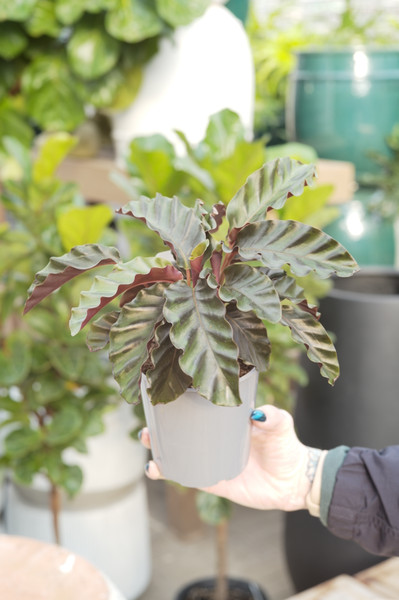Calathea Crocata
Posted by Hannah Brand on Jan 20th 2025
Weekly Plant Chat: Calathea Crocata
Hey Plant Friends!
This week we are talking about Goeppertia crocata, more commonly known as Calathea Crocata. This Calathea is known for its dark, velvety foliage and neon, yellow-orange flowers, hence its nickname - Eternal Flame. All Calathea require a bit of extra care and attention but can be very rewarding in the right conditions. Calathea Crocata recently gained the Royal Horticultural Society's Award of Garden Merit as a hothouse ornamental.
Family of Origin
Calathea crocata belong to the Marantaceae or Arrowroot plant family along with Prayer Plant, Stromanthe, and Ctenanthe. This Calathea is native to Bahia and Espírito Santo states of eastern Brazil.
Plant Care
Light
Indoors, place in bright, indirect to medium light. If you plan to put your plant outside for the summer avoid direct sunlight as this can cause leaf scorch. Calathea appreciate a nice shady spot outdoors and love summer humidity.
Soil
Plant in an all-purpose potting soil, or up your game with a maranta specific mix made up of 2 parts peat moss or coco coir, 1 part all-purpose potting mix, 1 part perlite, and 1/2 part charcoal.
Water
Check weekly for watering. Make sure to keep the soil evenly moist but not soggy. Allow the top 1/2 inch of soil to dry down before giving a good soak. If the soil becomes too dry, leaves will wilt, then curl and eventually brown around the edges.
Fertilizer
Fertilize weekly during periods of active growth with an all-purpose fertilizer such as Schultz All-Purpose Liquid Fertilizer. As growth slows in the winter months, fertilization may not be needed.
Hot Tips
Calathea can suffer from leaf curl, browning tips, and leaf drop. All of these problems are usually attributed to low water and low humidity. Check moisture levels often and increase humidity if necessary. Terrariums, cloches, or domes are an option too.
Calathea and other members of the Maranta plant family move in response to light levels. They raise their leaves at night and lower them in the daytime. This is called nyctinasty and is an adaptation to maximize light absorption while limiting water loss.
Keep an eye out for common pests such as mealy bugs and spider mites. Check for pests weekly while watering. Keep a bottle of Bonide’s Insecticidal Soap on hand for easy treatment.
Calathea are a non-toxic, pet friendly option.
Shop Now!
Calathea Crocata are available in 4” pots in the greenhouse.
Always approachable and happy to help!

